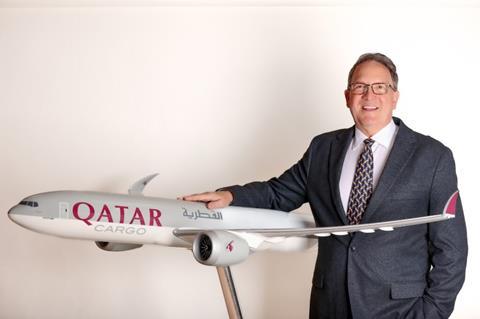Moving outsize and extremely heavy loads by air is a specialist business and a thriving one, according to the carriers, freight forwarders and handlers that are experts in the sector.
Qatar Airways Cargo operates a fleet of 28 dedicated Boeing 777 freighters, which offer the specialised capability to transport a wide range of heavy and oversized cargoes. Its freighters can transport pieces weighing up to 21.5 tonnes and out-of-gauge shipments up to 13 m in length.
While transportation of such heavy shipments is a part of its daily operations, the most common items that the Doha-based freight carrier handles are aircraft engines, oil well equipment, MRI scanners, heavy machinery, armoured vehicles, trucks, helicopters and yachts, says Mark Drusch, chief officer cargo at Qatar Airways Cargo.
The airline caters to diverse industry verticals including aerospace, oil & gas, automotive, power generation and medical and construction, supporting customers including manufacturers/shippers and project logistics companies.
There are certain routes on which the demand for heavy and out-of-gauge cargo is high. “However, we provide capacity and transport heavy cargo across our entire network,” Drusch says. “We also offer bespoke charter solutions for this specialised cargo to destinations that are not part of our scheduled services.”
Drusch believes that the market for air cargo heavy lift shipping is currently showing “a strong upward trend”. He informs: “We have seen a consistent increase in demand for our services in this market over the past few years.
“Qatar Airways Cargo is witnessing year on year growth of 50% in the transportation of heavy/oversize cargo. This cargo is primarily for power generation set-ups, manufacturing industry moulds, aerospace, oil & gas, etc.
“Our customers have trust in us and know they can rely on us when it comes to transporting such precise, heavy lift cargo, that must be handled delicately despite their size.”
Cargo agents, too, have to be trusted when outsize cargoes are moved under their auspices, and some freight forwarders are happy to be involved in outsize and heavy cargo shipments.
Daniel Wieland, senior vice president global projects & industry solutions at DB Schenker, stresses that airfreight represents an important part of the supply chain services provider’s projects business.
DB Schenker is of course intermodal in its coverage, using all modes of transport: ocean, air, land and rail. It’s difficult to say just how well the heavylift air side of the business is going because of that and because use of this particular mode “depends on so many factors” – including project schedules, timelines, capacity situation vis-a-vis ocean, etc, he says.
Certainly though, Weland agrees, business has recovered from the contraction in the market associated with Covid.
What is being moved by air by DB Schenker is carried on both regular – for example, its maintenance, repair and overhaul (MRO) businesses – but also as one-off shipments that involve charters.
Safety first
For Qatar Airways Cargo, “Safety is our number one priority. Transportation of heavy/outsize cargo possesses a higher risk profile in comparison with other general cargo due to its unique transportation requirements. It is critical to have specialised operations protocols in place which allow us to cater for any unique customer requests with 100% assurance on safety and integrity of operations.”
The freight carrier has a dedicated team of special load experts, providing end-to-end build-up and transportation solutions for all types of heavy/outsize cargo.
Critical members of the airline’s heavy equipment teams include loadmasters and weight & balance specialists who have extensive experience in planning and executing these challenging missions.
The team rely on aircraft manufacturer guidelines as their primary documentation reference, but they have also developed specialised operations procedures based on expertise in handling heavy/outsize cargo.
What would make a heavy lift cargo carrier’s work easier? Well, at Qatar Airways Cargo, “We are always looking at ways to modernise and innovate,” says Drusch.
“We collaborate with the best ground handling service providers across the globe. Most of our ground handlers have equipment to support heavy/outsize cargo transport.”
More specifically, though, the carrier talks with its ground handlers to consider investing in wider maindeck loaders to support the seamless transport of aircraft engines and engine cowls, “as this would be a valuable enhancement to meet the industry trend”.
Plus, “As the launch customer of the Boeing 777-8F, we are working with Boeing to ensure we utilise new technology to more efficiently and carefully handle our heavy and oversized shipments.”

Handling outsize air cargo
Amongst the cargo handlers who undertake the movement of these challenging loads onto and off aircraft operated by carriers such as Qatar Airways Cargo is the Dubai-headquartered air services provider dnata, whose operations director – cargo UK, Mick Southall, explains that some 8-10% of the cargo that it handles on flights through the UK is carried on freighters – some but not all of this being outsize cargo.
It has helped move high-end vehicles, for example, armoured vehicles, pipework and other equipment for the oil and gas industry, a commercial helicopter and even a 40-foot drone in recent times.
These outsize shipments are moving on commercial freighters such as Antonov, Airbus and Boeing all-cargo aircraft types, as well as military aircraft such as C-130 Hercules.
Of late, dnata has seen increasing demand for handling oil and gas-related loads, much of it to the Middle East, some to East Asia, Southall notes. It has also handled a higher frequency of top-end cars through its London Heathrow hub, he adds.
dnata has six stations in the UK; although the majority of its freighter operations are handled through London’s Heathrow Airport (which benefits from its geographical convenience for cargo customers as well as the large, local network of freight forwarders), it is also handling all-cargo aircraft movements through Birmingham and, now for the first time, Manchester.
It has invested particularly heavily at Manchester Airport to enable it to handle freighter operations and the outsize loads that these might involve there. (dnata’s other UK stations are at Glasgow, Newcastle and London Gatwick.)
Investment has been made in both personnel (especially in training) and equipment. For handling outsize freighter-carrying loads, dnata has equipment and vehicles including specialist towbars, maindeck lifters, transporters and cargo facility-based cranes for loading pallets. If one or more cranes are required for loading/unloading on the apron beside a freighter, a specialist private contractor will be asked to provide the necessary equipment.
Some of the heavy loads handled will also classify as dangerous goods (DG), which have to be handled with particular care to IATA’s as well as data’s own standards – the handler’s “safety first approach” adherence to “life-saving rules”, Southall affirms. For example, any fuel carried by vehicles will classify the load as DG.
It takes investment to offer the specialist equipment and workforce skills to handle heavy/outsize cargo, Southall points out, exactly what dnata has committed to in the UK.
Airport dedication
While Heathrow may be a preferred hub for outsize cargo in the UK, there are certain gateways around the world that have looked to specialise in this particularly challenging type of shipment, Germany’s Leipzig/Halle Airport, for example, is something of a specialist in the field of outsize and project cargoes, handling everything from parts for industrial facilities to railway vehicles and military equipment within the scope of the SALIS Programme (of which more below) – and even satellites.
It has also handled large loads of humanitarian aid for the German Red Cross, which are transported on freight charter flights from Leipzig/Halle.
In principle, several NATO countries that are part of the SALIS Project have access to AN-124 transport capabilities offered out of Leipzig/Halle. Flying back the contingent of German armed forces based in Mali through Leipzig/Halle involved, for example, the shipment of containers, armour-plated vehicles and even helicopters and entire underground trains.
Antonov Airlines, based in Ukraine prior to the outbreak of the conflict with Russia, has moved its operations to Leipzig/Halle Airport for the moment. According to Steffen Böttger, vice president sales cargo/logistics at the gateway, it did so because of the necessary infrastructure and the “experienced, competent workforce found here”.
He adds: “We are delighted that all the remaining five AN-124 aircraft operated by the airline currently have their home base here.” As well as ANTONOV Airlines’ SALIS operations, the carrier also undertakes commercial flights handling outsize cargo shipments.

Leipzig/Halle Airport has a wealth of experience in handling AN-124 cargo aircraft, Böttger observes. “These cargo planes have been regularly flying to the airport for about 20 years.”
It also handled more than 30 flights of the AN-225, which was the largest aircraft in the world until it was destroyed in the Ukraine war. All types of freight have also been handled, including DG. The airport has in the past loaded individual consignments weighing more than 160 tonnes.
In the recent past, Leipizg/Halle has handled increasing numbers of project shipments for the automotive sector, Böttger continues, while more generally, he notes: “We believe that there is potential here [for further project cargo shipments].
“Stable supply chains are the lifeline of the global economy. And customers find everything that they need at Leipzig/Halle to be able to transport all kinds of shipments to and from Europe, even if the preparation time for this is very short.”
The airport has multimodal connections and is open for cargo flights 24/7. The customs service is also available at the airport round the clock. There are specially trained personnel for pharmaceutical, e-commerce, DG and outside cargo shipments.
“All these features provide potential customers with the necessary reliability and flexibility to be able to act successfully in their project planning,” he concludes.
https://www.aircargonews.net/monthly-exclusive/heavylift-sector-faces-up-to-an-uncertain-market/















